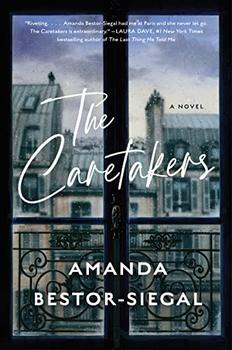Summary | Excerpt | Reviews | Beyond the Book | Readalikes | Genres & Themes | Author Bio

A Novel
by Amanda Bestor-SiegalPrologue
The Chauvet house is the only one on the block without a gate, not because the Chauvets can't afford the privacy, but because they want passersby to admire their front yard. They would deny this if anyone were to suggest it, but the motive is there in the fountain, the constellation of topiaries, the cluster of Lalanne sheep sculptures (acquired after some maneuvering by the wife, whose friendships with well-known artists somehow ambush most conversations).
The most interesting attraction in the Chauvets' yard, however, cannot be credited to the family (through their unintended efforts—yes, perhaps): the crumpled form of Charlotte Chauvet herself, knees hitting the grass, as a stretcher carrying her youngest son is ferried outside. It's a crisp March evening, the last of the month, sky finally slipping through the gray. The residents of Maisons-Larue take their first evening walks of spring. Those who pass the Chauvet house stop to watch the show, the firework of ambulance lights. Some avert their gaze at the sign of the stretcher. Others stare harder, transfixed by the white sheet, a body too small to be dead. Charlotte Chauvet on her knees, long after her son is gone. This night is the realization of her nightmares. Not the death of her youngest child (why would she anticipate such a thing?), but this aftermath: the witnesses, her own disintegration made public. This part of the performance—mother, collapsed—the neighbors watch without shame. This is what she gets, they think, for needing the world to see her front yard.
The next morning is the first of April. The recounting of the yard show's grand finale leaps from boulangerie to pharmacy to café: the Chauvets' au pair, a quiet, obedient American girl, was led out of the house in handcuffs. The police are opening a homicide investigation. Parents call their nannies and give them the day off, leave work early to go to the schools themselves, hug the precious, fragile bodies of their children who—confused, oblivious—conceal their delight by wriggling away. The working mothers blame the au pair. The child was her responsibility. The stay-at-home mothers blame Charlotte: this is what happens when you don't raise your own children. The other au pairs don't know whom to blame. They all know the girl sitting in the police cell. They've sat beside her in French class, stood beside her at the translator's office and the prefecture, waiting for their visa appointments. "I bet it wasn't an accident," one girl whispers, huddled with her friends at a café. "I always thought something was wrong with her," mutters another. They are hoping, secretly, for murder. If this were merely an accident, the au pair a helpless witness, then any one of them could have been that girl in the cell.
Overnight, while Paris slept, the city changed its Métro signs: the Quatre-Septembre station was renamed Premier Avril, the Opéra station became Apéro. There is a station called Potato, another station with its signs flipped upside down. The morning commuters gaze out the windows of the train, regarding each stop with their usual resignation, eyes half-focused until they reach one of the puns and do a double-take. Some laugh. Some peek around, worried they're the only ones who see it. Others pull out their phones, tap a photo of the altered signs. Tourists become anxious, convinced they've taken the wrong train. Students and au pairs, those with free time on a Friday, ride up and down the lines for hours. They double back, retrace their route, transfer five times, driven by the stubborn desire to personally photograph each fool station for themselves. It's the kind of joke that's funny only to those who speak French. A joke that says: You belong here, if you knew to laugh.
Commuters smile. For an unexpected moment, in an unexpected place, they feel okay. This is 2016, the era of France when soldiers in full riot gear, cradling their rifles, patrol the streets of Paris in groups. Purses and backpacks are searched at the entrance to each library, each market. On the buses and trains, alongside transportation maps and ads, there are cartoons depicting what to do in case of a terrorist attack. Escape, hide, alert. Cartoon people flee down the street. A cartoon man moves a sleek couch in front of a door.
Excerpted from The Caretakers by Amanda Bestor-Siegal. Copyright © 2022 by Amanda Bestor-Siegal. Excerpted by permission of William Morrow. All rights reserved. No part of this excerpt may be reproduced or reprinted without permission in writing from the publisher.
It is a fact of life that any discourse...will always please if it is five minutes shorter than people expect
Click Here to find out who said this, as well as discovering other famous literary quotes!
Your guide toexceptional books
BookBrowse seeks out and recommends the best in contemporary fiction and nonfiction—books that not only engage and entertain but also deepen our understanding of ourselves and the world around us.